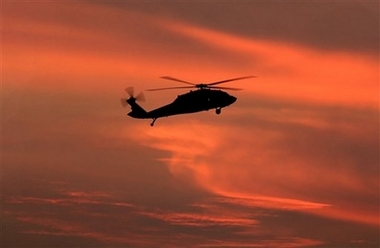Iraqi politicians try to forge coalition
(AP)Updated: 2006-12-22 11:05
BAGHDAD, Iraq - Radical cleric Muqtada al-Sadr has agreed to allow supporters to rejoin the Iraqi government after a three-week boycott, officials close to the militia leader said Thursday, as political rivals pushed to form a coalition without him.
Fighting in Iraq claimed the lives of three more American servicemen, the US military announced, bringing the US toll closer to 3,000 on a day new Defense Secretary Robert Gates was in Baghdad to discuss strategy with military commanders. In December, 71 American troops have been killed; at the current rate, the number of US combat deaths this month could meet or exceed the previous monthly record for 2006.
Secretary of State Condoleezza Rice told The Associated Press in an interview that Iraq was "worth the investment" in American lives and dollars and said the US can still win a conflict that has been more difficult than she expected.
"I don't think it's a matter of money," Rice said. "Along the way there have been plenty of markers that show that this is a country that is worth the investment, because once it emerges as a country that is a stabilizing factor you will have a very different kind of Middle East."
In the southern city of Najaf, delegates from seven Shiite parties appealed to Grand Ayatollah Ali al-Sistani, whose word is law to many Shiites, to support a planned governing coalition. The coalition would include Shiites, Kurds and one Sunni party - and bridge Iraq's treacherous sectarian divide.
Though al-Sistani is expected to approve the deal, he fears the coalition could weaken the Shiite bloc, officials close to him said on condition of anonymity because they were not allowed to speak to the press.
It seems likely that al-Sistani intervened to persuade al-Sadr to return to government and avoid a Shiite split. The Sadrist boycott has undercut Prime Minister Nouri al-Maliki's government and prevented it from passing legislation.
The new coalition would probably govern more efficiently than the current government, which has been criticized for its ties to al-Sadr. Al-Sadr's loyalists ¡ª 30 in the legislature and six in the Cabinet - walked off the job to protest al-Maliki's meeting with Bush in Jordan.
However, a new coalition government is not likely to end the threat from al-Sadr's militia. By ending the boycott, al-Sadr will retain some influence in parliament, and his apparent compromise may help him resist calls to curb his fighters.
Three politically influential Iraqis said the Sadrist boycott is ending. "Within two days, the al-Sadr movement will return to the government and parliament," said Abdul Karim al-Anizi, a Shiite lawmaker from al-Maliki's Dawa faction.
Two figures in al-Sadr's movement - an aide to the cleric and a member of parliament also said the cleric had agreed to allow his followers to end their boycott. They spoke on condition of anonymity because of the secrecy of the talks.
"We will rejoin the government and the parliament very soon," the lawmaker said. "We got some guarantees during our meeting today."
On Thursday, al-Sadr loyalists met with members of the Shiite bloc and laid out their demands, the lawmaker said.
"Our demands are to hand over the security file and not allow any regional interference in Iraqi affairs," he said, meaning, apparently, that U.S. forces must hand over all control of security forces to the Iraqi government.
The US military is gradually transferring responsibility for security to Iraqi troops in less violent areas, but doubts remain about whether the Iraqis will be able to replace American troops throughout Iraq in the near future.
Bush is considering whether to quickly send thousands of additional U.S. troops to the country to control the chaotic violence. There are 140,000 American troops in Iraq.
Defense Secretary Gates, after meeting with Iraqi officials, said discussions focused "mainly on the overall approach, including the possibility of some additional assistance." But the Pentagon chief, on his fourth day on the job, was vague about the type of assistance discussed, and said no specific numbers of extra troops were brought up.
Gates chatted over breakfast with U.S. soldiers, many of whom supported the idea of more troops.
"With more presence on the ground, more troops might hold them off long enough to where we can get the Iraqi Army trained up," Spc. Jason T. Green of the 1st Infantry Division told Gates.
As politicians and generals talked, the killing continued.
The U.S. military said Thursday that a Marine assigned to 1st Brigade, 1st Armored Division died Wednesday in Anbar, the province west of Baghdad where insurgents are strong. A soldier assigned to Regimental Combat Team 7 died there on Tuesday.
A roadside bomb killed an American soldier Wednesday and wounded three others south of the Iraqi capital, the military said.
At least 2,959 American troops have died since the beginning of the Iraq war in March 2003, according to an Associated Press count.
On Thursday, a suicide bomber killed 15 people and wounded 15 others in a crowd of police volunteers in eastern Baghdad, Iraqi police and the U.S. military said.
The dead included three police officers and 12 recruits. Bodies were strewn on gurneys and on the ground outside a hospital for hours, covered in blue sheeting as commuters passed by.
Officials also announced the murder of Iraq's Olympic cycling coach, killed after gunmen kidnapped him from his home.
Relatives identified the body of 48-year-old Mahoud Ahmed Fulayih on Monday, two days after he was abducted, said Hussein al-Amidi, the acting secretary general of Iraq's National Olympic Committee.
|
||
|
||
|
|

